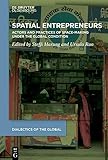Spatial Entrepreneurs : Actors and Practices of Space-Making Under the Global Condition / ed. by Steffi Marung, Ursula Rao.
Material type: TextSeries: Dialectics of the Global ; 7Publisher: München ; Wien : De Gruyter Oldenbourg, [2023]Copyright date: ©2023Description: 1 online resource (VIII, 197 p.)Content type:
TextSeries: Dialectics of the Global ; 7Publisher: München ; Wien : De Gruyter Oldenbourg, [2023]Copyright date: ©2023Description: 1 online resource (VIII, 197 p.)Content type: - 9783110639674
- 9783110686449
- 9783110686418
- 303.482
- HM654 .S63 2023
- online - DeGruyter
- Issued also in print.
| Item type | Current library | Call number | URL | Status | Notes | Barcode | |
|---|---|---|---|---|---|---|---|
 eBook
eBook
|
Biblioteca "Angelicum" Pont. Univ. S.Tommaso d'Aquino Nuvola online | online - DeGruyter (Browse shelf(Opens below)) | Online access | Not for loan (Accesso limitato) | Accesso per gli utenti autorizzati / Access for authorized users | (dgr)9783110686418 |
Frontmatter -- On the Series -- Contents -- 1 Between Empirical Messiness and Theoretical Ambition: Introducing Interdisciplinary Conversations on Actors and Practices of Space-Making Under the Global Condition -- 2 “Through Impenetrable Thicket and Swamps”: Negotiating US National Space in Popular Narratives about the Florida Frontier -- 3 National Forms with Economic Content? Gosplan’s Expertise on Territorializing the Soviet State, 1921–1930 -- 4 Tracing Female Spatial Entrepreneurs: SWAPO Women’s Council, the Democratic Women’s Union, and Their Women’s Sewing Centre in Tsumeb, Namibia, 1990–1992 -- 5 Routinizing Digital Banking: Kiosks as New Spaces of Social Action in Contemporary India -- 6 Rockefeller Foundation’s 100 Resilient Cities Programme: Principles of the Art of Organizing Socioecological Transformation by Philanthropic Means -- 7 Understanding Complex, Collective Actors at African Regional Organizations: AU and ECOWAS Intervention in The Gambia -- 8 Scaled Regulatory Regimes under the Global Condition: An Example from Organ Transplantation -- List of Abbreviations -- List of Contributors -- Index
restricted access online access with authorization star
http://purl.org/coar/access_right/c_16ec
As essential components of globalization, the study of practices and processes of space formation promotes a nuanced understanding of globalization. How do people create spaces for social action under the global condition, especially since the nineteenth century, when global interconnectedness increased rapidly? We explore the problem through specific case studies. Anthropologists, historians, geographers, sociologists, global studies scholars, and cultural studies scholars examine the agency of, e.g., members and staff of African regional organizations, Indian migrant workers, female GDR activists, Soviet planning experts, or US novelists. By studying elites as well as middle-class and micro-entrepreneurs – i.e. more and less influential actors – we encourage reflection on the relationship between power and space and examine how spatial entrepreneurs attempt to influence the shaping of space and their spatial literacy. The analysis aims at a better understanding of the different globalization projects, their crisis-like clashes, and the resulting conflictual development of spatial orders.
Issued also in print.
Mode of access: Internet via World Wide Web.
In English.
Description based on online resource; title from PDF title page (publisher's Web site, viewed 06. Mrz 2024)


